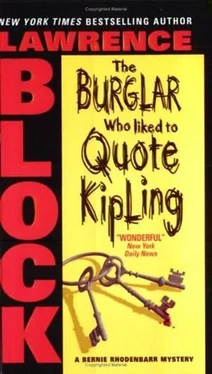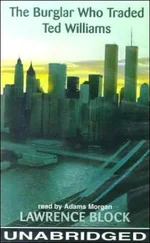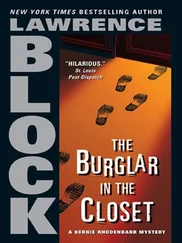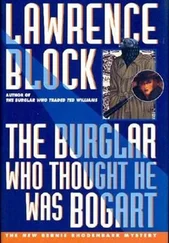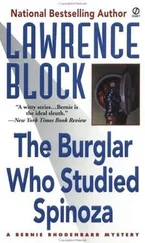“Or this place.”
“Huh?”
“Well, we’re friends. You come over here a lot. If they talk to enough people they’ll learn that, won’t they?”
“I hope not,” I said, and the phone rang. We looked at each other, not very happily, and didn’t say a word until it stopped ringing.
At six-fifteen I was sitting at the counter of the Red Flame at the corner of Seventieth and West End. I had a cup of coffee and a wedge of prune Danish in front of me and I wasn’t particularly interested in either. The other two customers, a teenaged couple in a back booth, were interested only in each other. The counterman wasn’t interested in anything; he stood beside the coffee urns chewing a mint-flavored toothpick and staring at the opposite wall, where a bas-relief showed a couple of olive-skinned youths chasing sheep over a Greek hillside. He shook his head from time to time, evidently wondering what the hell he was doing here.
I kept glancing out the window and wondering much the same thing. From where I sat I could almost see my building a block uptown. I’d had a closer look earlier from the sidewalk, but I hadn’t been close enough then to tell if there were cops staked out in or around the place. Theoretically it shouldn’t matter, but theoretically bumblebees can’t fly, so how much faith can you place in theory?
One of the teenagers giggled. The counterman yawned and scratched himself. I looked out the window for perhaps the forty-first time and saw Carolyn half a block away, heading south on West End with my small suitcase in one hand. I put some money on the counter and went out to meet her.
She was radiant. “Piece of cake,” she said. “Nothing to it, Bern. This burglary number’s a cinch.”
“Well, you had my keys, Carolyn.”
“They helped, no question about it. Of course, I had to get the right key in the right lock.”
“You didn’t have any trouble getting into the building?”
She shook her head. “Mrs. Hesch was terrific. The doorman called her on the intercom and she said to send me right up, and then she met me at the elevator.”
I’d called Mrs. Hesch earlier to arrange all this. She was a widow who had the apartment across the hall from me, and she seemed to think burglary was the sort of character defect that could be overlooked in a friend and neighbor.
“She didn’t have to meet you,” I said.
“Well, she wanted to make sure I found the right apartment. What she really wanted was a good look at me. She’s a little worried about you, Bern.”
“Hell, I’m a little worried about me myself.”
“She thought you were all respectable now, what with the bookstore and all. Then she heard about the Porlock murder on the news last night and she started to worry. But she’s positive you didn’t kill anybody.”
“Good for her.”
“I think she liked me. She wanted me to come in for coffee but I told her there wasn’t time.”
“She makes good coffee.”
“That’s what she said. She said you like her coffee a lot, and she sort of implied that what you need is somebody to make coffee for you on a fulltime basis. The message I got is that living on the West Side and burgling on the East Side is a sort of Robin Hood thing, but there’s a time in life when a young man should think about getting married and settling down.”
“It’s nice the two of you hit it off.”
“Well, we only talked for a couple of minutes. Then I went and burgled your apartment.” She hefted the suitcase. “I think I got everything. Burglar tools, pocket flashlight, all the things you mentioned. And shirts and socks and underwear. There was some cash in your shirt drawer.”
“There was? I guess there was. I usually keep a few dollars there.”
“Thirty-eight dollars.”
“If you say so.”
“I took it.”
“Oh,” I said. “Well, I don’t suppose thirty-eight dollars one way or the other is going to make a difference. But it can’t hurt to have it along.”
She shrugged. “You said you always take cash,” she said. “So I took it.”
“It’s a good principle. You know something? We’re never going to get a cab.”
“Not when it’s raining. Can we get a subway? No, not across town. Isn’t there a bus that goes over Seventy-ninth Street?”
“It’s not a good idea to take buses when you’re wanted for homicide. It’s awfully public.”
“I suppose we’ll get a cab sooner or later.”
I took the suitcase in one hand and her arm in the other. “The hell with that,” I said. “We’ll take a car.”
The Pontiac was right where I’d left it. Sometimes the tow-truck division lets things slide for a while, and this time the Pontiac ’s owner was the beneficiary of their lapse. I popped the door on the passenger’s side, let Carolyn in, and took a ticket from underneath the windshield wiper while she leaned across the seat to unlatch the door for me.
“See?” someone said. “You got a ticket. Did I tell you you’d get a ticket?”
I didn’t recognize the man at first. Then I saw the brindle boxer at the end of the leash he was holding.
“Sooner or later,” he told me, “they’ll tow you away. Then what will you do?”
“Get another car,” I said.
He shook his head, tugged impatiently at the dog’s leash. “Come on, Max,” he said. “Some people, you can’t tell them a thing.”
I got into the car, set about jumping the ignition. Carolyn watched the process fascinated, and it wasn’t until we pulled away from the curb that she asked who the man was and what he had wanted.
“He wanted to be helpful,” I said, “but all in all he’s a pest. The dog’s all right, though. His name is Max. The dog, I mean.”
“He looks okay,” she said, “but he’d probably be murder to wash.”
I left the Pontiac in a bus stop around the corner from where we were going. Carolyn said it might get towed and I said I didn’t care if it did. I got tools and accessories from the suitcase, then left the case and the clothes it contained on the back seat of the Pontiac.
“Suppose they tow the car,” she said, “and suppose they identify the clothing from laundry marks. Then they’ll know you were here, and-”
“You’ve been watching too much television,” I said. “When they tow cars they take them over to that pier on the Hudson and wait for the owner to turn up. They don’t check the contents. You could have a dead body in the trunk and they’d never know.”
“I wish you hadn’t said that,” she said.
“There’s nothing in the trunk.”
“How do you know for sure?”
We went around the corner. No one seemed to be keeping an eye on the elegant little brownstone. A woman stood in the bay window on the parlor floor, watering the plants with a long-spouted watering can. The can was gleaming copper, the plants were all a lush green, and the whole scene was one of upper-middle-class domestic tranquillity. Outside, watching this and getting rained on, I felt like a street urchin in a Victorian novel.
I looked up. There were lighted windows on the third and fourth floors, but they didn’t tell me anything. The apartments that interested me were at the rear of the building.
We entered the vestibule. “You don’t have to come,” I said.
“Ring the bell, Bern.”
“I’m serious. You could wait in the car.”
“Wonderful. I can play it safe by sitting in a stolen car parked at a bus stop. Why don’t I just wait in the subway? I could cling to the third rail for security.”
“What you could do is spend the next half-hour in the bar on the corner. Suppose we walk into an apartment full of cops?”
“Ring the bell, Bernie.”
Читать дальше
